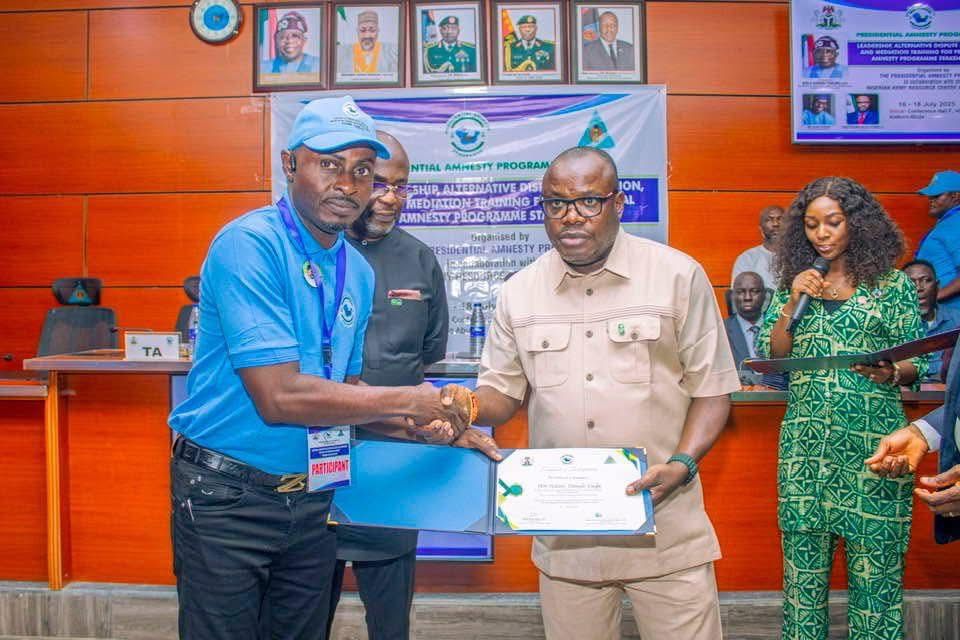Business
“Call for Gender Equality in Maritime Sector: Women Demand Greater Roles”

By Milcah Tanimu
Women in the maritime sector are pushing for more substantial roles, challenging stereotypes that label them as less capable of handling certain jobs or contracts, especially in the maritime industry. Currently, women actively engaged in clearing processes in the Nigerian maritime sector constitute less than 20 percent of the total licensed agents. Most women working around port areas are involved in point-of-sale services, selling recharge cards, vending food, making phone calls, and other ancillary roles.
This underrepresentation can be attributed to societal perceptions that women lack the physical strength or mental capacity to perform certain tasks. However, in reality, there is almost nothing a man can do that a woman cannot.
Recent developments in the maritime sector have shown that many ship owners are reluctant to have female seafarers on board their vessels. This bias has resulted in numerous qualified female seafarers being unemployed, while their male counterparts are allowed to work, even when some may not possess the same level of qualification as their female counterparts.
Contrary to these biases, research has shown that women tend to be more diligent and committed when given opportunities in the maritime sector.
Some of the challenges faced by the maritime industry could be attributed to the underutilization of women’s potential.
Mrs. Rollen Macfoy, the Nigerian Chapter Chairperson of Women in Maritime Africa, emphasized the importance of providing women with equal opportunities in the sector. She urged the Minister of Marine and Blue Economy, Adegboyega Oyetola, to prioritize capacity building for women and to consider appointing women to key positions. Macfoy believes that by doing so, women will contribute significantly to the sector’s advancement.
Macfoy lamented the low representation of African women in the maritime industry, stressing that women are prepared to collaborate with the minister and contribute their expertise to drive the new ministry forward.
At the 2023 Lagos International Maritime Week, Damilola Adebimpe, Vice President of the Female Seafarers Association of Nigeria, highlighted the challenges women face in the sector. She pointed out that some Nigerian ship owners do not hire female seafarers due to perceived limitations in ship facilities. Adebimpe emphasized that women can achieve as much as men and advocated for equal opportunities in the industry.
In conclusion, women in the maritime sector are advocating for equal opportunities and recognition of their capabilities to contribute effectively to the industry’s growth. They call for gender-sensitive policies and an end to gender biases in the sector.
Business
Dangote Refinery Boosts Fuel Exports as Gulf Refineries Shut Down

By: Fabian Apechihin
The Dangote Petroleum Refinery has ramped up fuel exports to international markets amid widespread refinery shutdowns in the Middle East, industry sources confirmed.
A senior official at the $20bn Lagos-based plant told The PUNCH that the facility exported significant volumes of petrol (PMS), diesel (AGO), and aviation fuel (Jet A1) to foreign buyers in August, following earlier shipments in June and July.
The surge comes as Saudi Aramco and other regional producers face heavy maintenance schedules, tightening fuel supply. Aramco has already shut down two plants and plans further closures, including its 460,000 b/d Satorp refinery in Jubail for a 60-day turnaround in November–December. Kuwait and India are also scaling back capacity for maintenance and seasonal demand.
According to Argus Media, these shutdowns are pushing Gulf nations to import record volumes of gasoline, with Saudi Arabia and the UAE sharply increasing purchases from Europe and other markets in recent months.
While some reports pointed to operational constraints at Dangote’s 650,000 b/d facility, the company dismissed such claims, insisting production is on track to reach 700,000 b/d by December. Earlier this year, Aliko Dangote announced the refinery had sold two cargoes of jet fuel to Saudi Aramco and recently achieved exports of about 1 million tonnes of petrol between June and July.
“With Gulf refiners offline, Nigeria has now emerged as a net exporter of refined products,” Dangote said.
Analysts suggest the extended refinery outages in the Middle East will further strengthen demand for Dangote’s output, positioning the Nigerian plant as a key supplier in regional fuel markets.
Would you like me to tighten this further into a 5–6 paragraph wire-style news brief, or keep it as a detailed feature-style report with more context on Gulf refinery shutdowns?
Business
US Oil Exports to Nigeria, Others Fall to 3.3m bpd as Local Output Rises

By: Fabian Apechihin
The United States’ crude oil exports to Nigeria and other African countries fell for the fifth consecutive month in July 2025, averaging 3.3 million barrels per day (bpd), the lowest level since March 2022.
The Organisation of Petroleum Exporting Countries (OPEC) disclosed this in its August 2025 Monthly Oil Market Report (MOMR), attributing the decline to weaker flows to Europe and Africa, particularly Nigeria, but without giving further details.
Industry analysts link the slowdown to the ramp-up of local refining capacity, especially the 650,000 bpd Dangote Refinery, which has reduced Nigeria’s reliance on imported crude, including from the US. Vanguard checks also show that crude importation has slowed further in recent months due to improved domestic production.
According to OPEC data, Nigeria’s crude oil output—excluding condensates—rose by 11 per cent year-on-year to 1.559 million bpd in July 2025, up from 1.386 million bpd in the same period of 2024. This marks the country’s highest monthly production level so far this year.
The Nigerian Upstream Petroleum Regulatory Commission (NUPRC) corroborated the figures, stating that overall output, including condensates, exceeded 1.8 million bpd in July.
Gbenga Komolafe, Chief Executive of the NUPRC, said the milestone was achieved through the agency’s “Project 1 MMBOPD Incremental” initiative, supported by a multi-stakeholder collaborative framework.
“We are glad to report that we crossed the 1.8 million bpd mark on peak production last month, with average production hovering at 1.78 million bpd,” Komolafe stated.
He added that the Commission is working to sustain production growth by optimising the Maximum Efficient Rate (MER) framework, improving produced water management, and aligning operational shutdowns and maintenance schedules to minimise disruptions.
“With these measures and continued collaboration, the presidential mandate on production increase is well within reach,” he said.
Do you want me to make this rewrite more concise for a newspaper front-page brief or keep it detailed like a full energy market report?
Business
NDYPC Hails Otuaro’s Reforms in Presidential Amnesty Programme

• Lauds transparency, fairness in beneficiary selection and grassroots empowerment
• Says reforms align with Tinubu’s Renewed Hope Agenda, restore trust in Niger Delta
The Niger Delta Youths for Positive Change (NDYPC) has commended the Administrator of the Presidential Amnesty Programme (PAP), Dr. Dennis Otuaro, for what it described as bold, people-focused reforms that are restoring trust and delivering tangible benefits to the Niger Delta.
In a statement signed and issued by Comrade Elliott Yibakeni, after the conclusion of leadership training sessions with ex-agitator leaders in Abuja, the group said the PAP, once in urgent need of renewal, is now undergoing a transformation that reflects transparency, fairness, and accountability.
“At a time when public trust in institutions was waning, Dr. Otuaro has emerged as a symbol of credibility and transformation,” the statement read. “His visionary leadership is restoring integrity, empowering communities, and driving a sustainable development agenda that resonates with the aspirations of the Niger Delta.”
According to NDYPC, under Otuaro’s leadership, beneficiary selection has become fair and merit-based, ending years of favoritism and political interference. The group added that access to education, skills training, and empowerment opportunities, both locally and abroad, is now guided by equity and open competition.
The group highlighted several internal reforms, including improved staff welfare, strengthened professional capacity, and strict adherence to best practices in public procurement. These, it said, have made the PAP more efficient, responsive, and transparent.
NDYPC also praised Otuaro’s inclusive governance style, noting his sustained engagement with traditional rulers, women leaders, civil society organizations, and local communities. This approach, the group said, has strengthened peace-building efforts and deepened trust between the PAP and the people it serves.
In line with President Bola Ahmed Tinubu’s Renewed Hope Agenda, the PAP has maintained consistent payment of stipends to ex-agitators and extended direct support to vulnerable populations. NDYPC also applauded new healthcare interventions for ex-agitators facing health challenges.
The statement further commended the programme’s investments in scholarships, vocational training, and economic empowerment initiatives aimed at preparing Niger Delta youths for leadership, innovation, and sustainable livelihoods.
“Every decision reflects a deep commitment to public trust, responsible stewardship, and long-term development,” NDYPC stated. “Under Dr. Otuaro’s watch, the Niger Delta is rising stronger, united, and filled with renewed hope.”
-

 Uncategorized5 years ago
Uncategorized5 years agoFG, states urged to harness flooding for ranching, others with technology – Agbaje
-

 Headlines10 years ago
Headlines10 years agoBreaking: EFCC seals Borno House of Assembly, as Hon members take to their heels
-

 News11 years ago
News11 years agoNigeria Security Operatives Stage Manhunt For Homosexual Perpetrator
-

 News9 years ago
News9 years agoHow 21-year-old Girl fled community over accusation of lesbianism
-

 News10 years ago
News10 years agoYobe Gov Moves Against Deputy
-

 Opinion7 years ago
Opinion7 years ago7 signs she has friend zoned you
-
Technology4 years ago
Online job placement company headhunts women
-

 Headlines10 years ago
Headlines10 years agoBorno Dep Gov Abducts Another Church Leader





